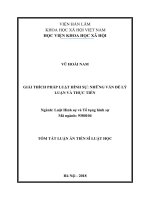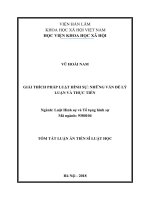Xã hội học hình phạt những vấn đề lý luận và thực tiễn (2)
Bạn đang xem bản rút gọn của tài liệu. Xem và tải ngay bản đầy đủ của tài liệu tại đây (452.27 KB, 27 trang )
VIETNAM ACADEMY OF SOCIAL SCIENCES
GRADUATE ACADEMY OF SOCIAL SCIENCES
K
VO KHANH LINH
SOCIOLOGY OF PUNISHMENT:
THEORETICAL AND PRACTICAL
MATTERS
Major: Criminal Code and Criminal Procedure Code
Code
: 62 38 01 04
ABSTRACT OF DOCTORAL
DISSERTATION ON LAW STUDIES
HANOI, 2016
HÀ N I, 2016
The dissertation was completed at
GRADUATE ACADEMY OF SOCIAL SCIENCES
Scientific instructor: Assoc. Prof. Dr. Tran Dinh Nha
1st Reviewer: Prof. Dr. NGUYEN NGOC ANH
2nd Reviewer: Assoc. Prof. Dr. HO SY SON
3rd Reviewer: Assoc. Prof. Dr. HOANG THI MINH SON
This dissertation will be defended before Doctoral Dissertation
Evaluation Board at Graduate Academy of Social Sciences
At
on
2016.
The dissertation can be available at:
-
National Library of Vietnam
-
Library of Graduate Academy of Social Sciences
LIST OF PUBLISHED RESEARCH WORKS OF THE
AUTHOR RELATING TO THE DISSERTATION
1.
Vo Khanh Linh, Research situation on punishment in Vietnam
during the past time and matters requested for further
research, Journal of Social Science Manpower, No.1/2016,
p.11-25
2.
Vo Khanh Linh, Social change and punishment type and
system: some theoretical matters, Journal of Social Science
Manpower, No. 5 (36), p. 31 – 37.
3.
Vo Khanh Linh, Social nature of punishment: some theoretical
matters, Journal of Social Science Manpower, No. 6 (37), p. 40
– 49.
4.
Vo Khanh Linh, Social decisiveness of punishment: some
theoretical aspects, Journal of Social Science Manpower,
No.10 (41), p. 30 – 36.
5.
Vo Khanh Linh, Social function of punishment, Journal of Law
and Democracy, No. 11, p.
PREFACE
1. The essential of the subject
Punishment is always a subject attracted attention of science
researchers in the field of criminal justice, human rights and other
social sciences.
Approaching
punishment
from
social
aspect
brings
significant meaning in terms of theory and practice. Thereby,
punishment is approached lively in socio-legal life but not merely
regulations about the most severe coercive measure of the State
stipulated in the criminal code.
With such approach, it can be seen that social aspect of
punishment is new and essential subject in theory and practice. For
enlightening this research subject, the first thing is to develop and
complete basic theoretical framework. Because of these reasons, the
author selected “Sociology of punishment: theoretical and practical
matters” as subject of the doctoral dissertation.
2. Research Objectives and Tasks
2.1. Research objectives
Theoretical research is defined as main objective of the
dissertation. General research on social practices and punishment
practices is used for demonstrating theoretical arguments presented in
the dissertation.
2.2. Research tasks
Firstly, to collect and systematize the selected and typical
scientific works on punishment; Secondly, to interpret general
1
theoretical matters on sociology of punishment; Thirdly, to clarify the
social decisiveness of punishment; Fourthly, to interpret the
effectiveness of punishment.
3. Subject and scope of research
3.1. Research subjects
Research subjects of the dissertation includes: Firstly, social
nature, social role, social purpose and social function of punishment;
Secondly, notion of social decisiveness of punishment; mechanism
social decisiveness of punishment; some impacts of social change for
punishment; evaluation of development trend of punishment in
Vietnam today; Thirdly, concept of effectiveness of punishment;
evaluation criteria and factors ensuring the effectiveness of
punishment.
3.2. Scope of research
Scope of research is defined: Firstly, within the theoretical
scope, the dissertation approaches punishment as a socio-legal
phenomenon; it focuses on analyzing social aspects of punishment;
Secondly, within the practical scope, practical matters which are
approached by the dissertation are social practices, general
punishment practices for serving the justification of theoretical
argument.
4. Methodology and Research methods
4.1. Research methodology
The dissertation studies punishment by multi-and interdisciplinary approach in terms of social science, law studies in
2
combination with theoretical knowledge on legal philosophy, legal
sociology, criminal law, criminology, psychology, sociology, etc.
4.2. Research methods
The dissertation uses traditional research methods such as
synthetic method, analysis method, historical method, comparison
method, observational method.
5. New scientific contribution of the dissertation
The author confirms that theoretical research results are
main contribution of the dissertation. It provides important
arguments for establishing and implementing research trend on
sociology of punishment as an urgent field of criminal law science
in our country today.
6. Theoretical and practical significance of the dissertation
6.1. Theoretical significance
The research results will enrich knowledge on punishment;
establish new research orientation on punishment; suggest some
research directions on certain social aspects of punishment in the
coming time…
6.2. Practical significance
The research results will be used for practical evaluating the
impacts of social change for punishment policies of our country
currently; practical evaluating the trend of punishment development
of our country currently; evaluating effectiveness of each type of
punishment, punishment system and process of development,
application and execution of punishment during the past time; and it
3
will be the basis for developing orientations, solutions to improve
effectiveness of punishment in our country in the context of legal
renovation…
7. Structure of the dissertation
Besides the preface, conclusion, list of published research
works of the author relating to the dissertation, and list of references,
the dissertation consists of 4 chapters, 15 items and sub-items.
CHAPTER 1
OVERVIEW OF RESEARCH TOPICS RELATING TO THE
DISSERTATION
1.1. The situation of foreign research
After referring to some foreign research papers, some
conclusions regarding to research topics of the dissertation can be
made as follows: Firstly, the works pointed out with scientific basis
about the necessity of implementing new research direction on
punishment, that is sociology of punishment; Secondly, the works
showed the importance of research in social decisive mechanism of
punishment and the evaluation of social effectiveness of punishment;
Thirdly, the works showed the science value of research on sociology
of punishment in analyzing and defining development orientation of
punishment in social life.
1.2. The situation of domestic research
In the dissertation, domestic research papers on punishment
are classified by topic groups: Firstly, group of research papers on
4
concept, nature, purpose and effectiveness of punishment; Secondly,
group of research papers on punishment system and type of
punishment; Thirdly, group of research papers on regulations for
sentencing; Fourthly, group of research papers on regulations
regarding serving the sentence and putting on probation; Fifthly,
group of research papers on punishment comparison.
General assessment of state of research on sentencing
regulations during the past time is outlined in the following three
major viewpoints:
Firstly, researches on punishment are mostly under the trend
of human/positive law; analysis, and interpretation of punishment are
based on criminal regulations and laws on punishment; researches
interpret current situation of regulation application in the practices
then make recommendations and solutions for improvement.
Secondly, scientists have gradually more open in expanding
orientation, new method and multi-and inter-disciplinary approaches
in punishment research.
Thirdly, a number of research works have addressed
different aspects of punishment in which they particularly pay
attention to social aspects of punishment, although it has not been
systematized into big matters.
1.3. Studied matters of the dissertation
The dissertation will focus on clarifying the following
matters: Firstly, it is necessary to speed up the study on nature of
punishment, especially social nature; Secondly, it is necessary to
5
study functions of punishment as a basic theoretical matter of
punishment; Thirdly, it is necessary to lay the foundation for research
on social decisiveness of punishment; Fourthly, it is necessary to
study the impacts of social change for punishment; Fifthly, it is
necessary to further reinforce the research on effectiveness of
punishment.
Therefore, the biggest research question of the dissertation is
whether sociology of punishment is new research approach of
punishment or not? Research hypothesis of the dissertation is
sociology of punishment is new research direction on punishment
currently and is feasible in conducting research. The dissertation
continues raising research questions as follows: Firstly, general and
basic theory of sociology of punishment consists of what matters?
Secondly, the formation and development of punishment type and
system, process of sentencing are governed by what factors? Thirdly,
how to evaluate, analyze the results of punishment achieved during
social impacts?
CHAPTER 2
GENERAL THEORETICAL MATTERS ON SOCIOLOGY OF
PUNISHMENT
2.1. Punishment – sociological research approach
2.1.1. Evidence-based research approach on punishment
Approach to human/positive law studies or legal positivism
is historical research approach and it is suitable with development
conditions of legal science in general and criminal law science in
6
particular in our country in recent years. With this method and
approach, studies on punishment have got certain achievement in
many aspects. Although many researches today have gradually paid
more attention to other sides and aspects of law, it can be said that
legal scientific researches are mostly based on legal regulations.
2.1.2. Research approach on sociology of punishment
The formation and development orientation of punishment
are not only decided by legislative thinking but also (mostly)
determined by social factors, conditions and demand. So, sociology
of punishment is research direction on punishment as a socio-legal
phenomenon, interpretation of social aspects of punishment, impacts
of social conditions to punishment processes and evaluation of
impact of punishment in social life.
2.1.3. Researched subject (content) of sociology of
punishment
Major issues of sociology of punishment includes: Firstly,
basic social aspects of punishment; Secondly, social decisiveness of
punishment; Thirdly, effectiveness of punishment.
2.2. Social nature of punishment
2.2.1. Concept of social nature of punishment
Social nature of punishment is combination of aspects,
attributes, inner social aspects having inter-relationship defining
content, formation, application and execution of punishment.
Understanding social nature of punishment shall be answered the
following research questions: Firstly, punishment is approached from
7
which perspectives and aspects? Secondly, where do the root and
source of punishment come from? Thirdly, punishment itself contains
and reflects which issues and fields of social life?
2.2.2. The expression of social nature of punishment
2.2.2.1. Punishment is a socio-legal phenomenon
Punishment has function of adjusting, regulating and
controlling social relations which it concerns. Therefore, punishment
does not fully independent, and stands outside social life; on the
contrary, punishment shall penetrate to life, to each social relation,
each social person for implementing its role, function and purpose.
Punishment is the unity of social interest, social conflicts and social
agreement. Punishment is the transshipment of common benefits of
society.
2.2.2.2. Punishment derived from society
Punishment stems from justifiable force in self-defense of
each individual before invasion of committed crime. Punishment is
self-defense measures of society. Karl Marx also stated that
“Punishment is nothing less than self-defense trick of the society
against acts of infringement upon the conditions of this social
existence”. We cannot separate analysis on origin of punishment
from social sides and aspects. Clearly, social origin and legal origin
of punishment are two associated matters but cannot be identical to
each other.
2.2.2.3. Punishment contains and transships socio-legal
information
8
When learning socio-legal information of punishment, it is
necessary to clarify three major issues: Firstly, information contains
and transmits what information and brings what knowledge?
Secondly, how is socio-legal transmission channel of punishment?
Thirdly, meaning of socio-legal information which punishment
contains and transmits?
2.2.2.4. Punishment reflects social norms
No matter of under which form, social norms which are
reflected by punishment shall establish behavior, including “possible
things”, “allowable things”, “unallowable things” and “compulsory
things”. System of social norms of punishment is mostly composed
from the following factors: legal norms, political norms and ethical
norms.
2.3. Social role of punishment
2.3.1. Concept of social role of punishment
Social role of punishment is expressed through: Firstly, role
of punishment toward social life; Secondly, role of punishment types
in social life; Thirdly, role of punishment types in punishment
system. Therefore, social role of punishment is general expression of
interaction of social impact of punishment in practice through its
own ways and manners.
2.3.2. Expression of social role of punishment
Expression of social role of punishment is represented
through the influence mechanism of punishment to social life,
through means and ways of enforcement and persuasion. So it is
9
necessary to clarify: Firstly, form, extent and limit of the use of
means and ways of enforcement and persuasion of punishment;
Secondly, the relationship between balancing and harmonizing means
and ways of enforcement and persuasion when using punishment;
Thirdly, factors deciding extent and amount of means and ways of
enforcement and persuasion of punishment.
Extent, limit and relationship between balancing and
harmonizing means and ways of enforcement and persuasion in the
use of punishment should be implemented in order as follows:
Firstly, it is necessary to define development orientation of the use of
ways of enforcement and persuasion in punishment system; secondly,
it is necessary to define each certain social role of each type of
punishment in punishment system; thirdly, to determine each certain
role of each punishment type in social life.
2.4. Social purpose of punishment
2.4.1. Concept of social purpose of punishment
Purpose means “expectation in human consciousness about
results to be achieved by its activities. With the characteristic of
direct motivation, purpose guides and regulates all actions”. Basic
concept of social purpose of punishment may initially be defined as
follows: Social purpose of punishment is positive social results in
which the person formulating, applying and executing punishment
expects to achieve in practice, from which development orientation
and social impact of punishment will be directed.
2.4.2. Social purposes of punishment
10
Fighting against crime shows social objectives and outcomes
which punishment wants to achieve, they are: firstly, to limit, prevent
and reduce criminal offence; secondly, to stabilize criminal offence;
thirdly, to strive to eliminate criminal offence. These social
objectives and outcomes are classified by hierarchy: direct purpose,
intermediate purpose and final purpose. Social purposes of
punishment are also classified to general purposes and particular
purposes. Criteria for determining particular social purposes are:
firstly, type of crime which punishment focuses on fighting;
secondly, type of punishment used for fighting against corresponding
crime. If approaching social purposes of punishment in terms of
outcomes of strategic social impact process, social purposes can be
classified to short-term purpose and long-term purpose.
,
2.5. Social function of punishment
2.5.1. Concept of social function of punishment
Function of the law, as often said is “impacts of laws to
social relations for maintaining order and bringing benefits for
society including benefits of ruling class”. With such approach, it can
be understood that social function of punishment is specific social
impacts in using punishment according to orientation of objectives
set by criminal code.
2.5.2. Social function system of punishment
2.5.2.1. Function of crime prevention
Punishment must be able to discover, affect and mitigate
cause-and-conditional factors of crime. If punishment is for
11
responding to on-going certain crime without concerning long-term
goals of identifying typical cause and condition of crime for having
strategic impact in the future, function of crime prevention of
punishment will not have the most effective results. For effective
implementation of function of crime prevention of punishment,
special attention should be paid into social process of punishment,
particularly the development, application and execution process.
2.5.2.2. Function of education and improvement
Punishment performs its education function in three levels:
Firstly, forming the understanding of punishment in each individual;
secondly, forming mental process of avoiding to put himself in the
position of relating to criminal law for bearing punishment; thirdly,
individuals realize their wishes by not violating prohibition
provisions of criminal code.
Re-educating criminal offenders is all the impact measures
used for eliminating negative factors as the cause and condition
leading to their violation, strengthening positive factors so that they
can self-adjust and improve their awareness and have more suitable
behavior which is in line with criminal laws and social norms.
2.5.2.3. Function of justice warranty and execution
Punishment is expression of social justice. Using punishment
for executing justice is ensuring fairness, rationality, social values,
ethics, laws, and other advanced social values. Punishment ensures
justice warranty and execution through the following basic
expression: Firstly, punishment shows the strong condemnation
12
together with strict attitude of the State toward dangerous actions
considered as crime; Secondly, punishment ensures and executes
justice when it strictly follows the principle of personalizing criminal
liability; Thirdly, punishment is means, ways to recover and
compensate within the ability social consequences caused by crime.
CHAPTER 3
SOCIAL DECISIVENESS OF PUNISHMENT
3.1. Social decisiveness of punishment – some theoretical
aspects
3.1.1. Theoretical basis of social decisiveness of punishment
Development trends of the laws are determined by social
needs, benefits which are essentials rather than merely and absolutely
subjective role of state power-holding class and law-makers. Changes
and movements take place in daily social life will inevitably be
recognized, described and explained by law sooner or later through
reflective thinking of law-makers. In other words, “Normally, sooner
or later social relations will clear their ways for legal practice,
although, legislation agencies have not accepted the new norms
which have been shown in legal practices.”
3.1.2. Concept of social decisiveness of punishment
Social decisiveness of punishment is one of characteristics,
basic attributes and rule of punishment. Punishment has its own
process; each process of punishment is placed in close connection
13
with typical social relations, forming a systematic interaction
between social reality and punishment. Social relations arising in any
certain process of punishment will determine impact tendency of this
process in reality.
With this viewpoint, we can initially give out basic concept
on social decisiveness of punishment as follows: Social decisiveness
of punishment is characteristics, basic attributes reflecting
interacting relations between punishment and social reality,
interpreting forming, developing trends and process of punishment
on the basis of conditions, factors and social basis.
3.1.3. Sociology developing punishment
Developing punishment is socio-legal design process, so this
process is much influenced by social life, especially development
trends of the criminal situation. These social conditions reflect
fighting demand against criminal situation by punishment; therefore,
it greatly governs design process regarding content and procedures of
promulgating regulations on punishment.
3.1.4. Sociology of punishment imposition
Specific social conditions affect not only practice of defining
severity of a dangerous behavior for society that is conducted based
on grounds for making decision in punishment, but also different
aspects of subjects involving in decision-making process in
punishment imposition. This is a foundation to point out clearly
influences of social conditions on characteristics of punishment
imposition process in practice.
14
3.1.5. Sociology of execution of punishment
Execution of punishment is a process that is much influenced
not only by social conditions of sentenced person but also by social life.
Social conditions are arisen from social relationship created by a
punishment execution act.
3.2. Social decisive mechanism of punishment
Social decisive mechanism of punishment is basically known
as a systematic and regular operation way of interaction process
between punishment and social reality, specific social relationship
and people. This mechanism details the relationship between
infrastructure
and
superstructure,
in
which,
specific
social
relationships (infrastructure) will decide different aspects of
punishment (superstructure).
3.3. Social change and punishment
3.3.1. Concept of social change
Social change is a social process, expressing a basic
transformation of perception, ideation, social consciousness as well
as behavior of people leading to a change that are results in social
reality recognized over a reasonable time. Social change includes
following attributes: ongoing process, being-decided by people, scale
and consequence.
3.3.2. Social change and awareness of punishment
Circumstances
with
different
social
conditions
have
important influence on formation of thoughts on awareness of
punishment. Change of types and system of punishment, trend of
15
non-criminalization
and
criminalization
is
originated
from
reconceiving different aspects of punishment. Although the matter of
awareness comes from human being but social change itself has a
significant influence on such awareness process.
3.3.3.
Social
change
and
non-criminalization,
criminalization
3.3.3.1. Social change and non-criminalization
Non-criminalization requires social foundation for it. Social
change is a social phenomenon ruling trends of non-criminalization.
Social
change
requiring
non-criminalization
demands
some
adjustments in design of content, regulation of type and system of
punishment. Only social change at a certain status, level and scale
can require non-criminalization.
3.3.3.2. Social change and criminalization
Foundation of criminalization must handle with following
problems: Firstly, what is the reason why dangerous behaviors for
society which are regulated as crimes have been in trend of more and
more serious? Secondly, why have some dangerous behaviors for
society that were not subject for criminal liability previously, but
become more and more serious and required crime liability to be
regulated and creating sanctions for them? Thirdly, is there any
explanation for the appearance of more and more new dangerous
behaviors for society that make criminalization policy necessary?
16
3.3.4. Social change and type and system of punishment.
Criminal Code enacted in 1985 were amended and supplemented four
times. There were many significant changes regarding sentencing
regulations, particularly in general provisions and criminal offences
parts. Social reason was a main element resulting in change of
sentencing regulation. In general, it can see that viewpoints of
enhancement of criminalization, pressing severity of punishment
were major trend of sentencing regulations during 14 effective years
of 1985 Criminal Code.
Criminal Code enacted in 1999 were amended and
supplemented one time in 2009. Changes in sentencing regulations
during effective time of 1999 Criminal Code included: Removal of
sentence: “Stripping title of servicemen”; Regulation on “Expulsion”
was added as a new sentence; some changes in regulation on
pecuniary penalties; reducing imposition of death sentence.
17
CHAPTER 4
EFFECTIVENESS OF PUNISHMENT
4.1.
Fundamental
methodology
for
researching
effectiveness of punishment
Current studies show that it is necessary to have a systematic
approach in assessment of effectiveness of laws, so it can be seen that
there are various ways of approach in this topic study. Assessment of
effectiveness of laws is assessment of social results of laws in life
practice. Researchers assess effectiveness of laws via relationship
between objectives of laws which was set out in thinking and
practical results. Research on effectiveness of law cannot be
separated from “social cost” which is a criterion for assessment.
Effectiveness of a law is not only the quality of law but capability of
organization and enforcement of laws in life. Theory on effectiveness
of laws helps clarify scientific connotation of itself and most
importantly, the research results will be fundamentals for
development of specific research on effectiveness of legal sectors,
effectiveness of legal regulations.
4.2. Concept punishment effectiveness
Effectiveness of punishment is possibility and prospect of
achieving objectives or in other words, objectives are shaped trend
and prospect of punishment effectiveness. Effectiveness of
punishment has a close relationship with social cost used to develop,
apply and enforce regulations in practice. In order to assess
18
effectiveness of punishment, it is necessary to have researches on
assessment criteria and elements to ensure effectiveness of
punishment. Effectiveness must be ensured through social process of
punishment, from imposition to execution in practice. Effectiveness
of punishment is ensured by effectiveness of each type of punishment
and each process of punishment. In order to assess accurately
effectiveness of punishment, quantitative and qualitative sociological
methods are required to be used. With such analyses, basic concept of
punishment effectiveness can be defined as follows: Effectiveness of
punishment is an extent of realization and satisfaction of social
benefits during its impacting on reality of each type and system of
punishment corresponding to set out objectives and demands in
society.
4.3. Assessment criteria of punishment effectiveness
4.3.1. Concept of assessment criteria of punishment
effectiveness
Assessment criteria of punishment effectiveness are a system
of basis inside process of social activities of each type, system of
punishment aiming at assessing extent of realization and achievement
of practical social results corresponding to set out objectives and
demands in society.
4.3.2. System of assessment criteria of punishment
effectiveness
4.3.2.1. Punishment imposition frequency
19
Indicators reflecting imposition frequency of a sentence are
analyzed to assess effectiveness of the sentence in practice. High
imposition frequency of this sentence or low imposition frequency of
other sentence comes from different reasons. It is not reasonable to
pay attention to sentences with high imposition frequency but to
disregard sentences with low imposition frequency. If imposition
frequency of a specific type of punishment is low but it can realize
role, purpose and social function of itself, the punishment
effectiveness is still ensured. Conversely, if a sentence is imposed
with high frequency but social results cannot achieve their purposes,
obviously, the effectiveness would not be high.
4.3.2.2. Extent of self-education and self-improvement of a
criminal offender
For a criminal offender, sentenced person, the extent of selfeducation and self-improvement is divided into following groups of
basic indicators: firstly, indicators reflecting self-awareness of fault,
consequence of criminal offence and legitimacy for suffering a
sentence; secondly, indicators reflecting insight and perception of
values of punishment during execution process; thirdly, indicators
reflecting ability to decide behaviors which is suitable to standards
during education process of a being-served sentence and after the end
of a sentence.
Extent
of
self-awareness
and
self-education
through
influence of death sentence comes from individuals in society has
following indicators: firstly, indicators of extent of self-awareness of
20
negative consequences of criminal sanctions through social
understandings and experience; secondly, indicators of standard level
in common behaviors of citizens in legal compliance and nonviolation of criminal laws; …
4.3.2.3. No new offence committed
There are basic indicators for no-new-offence-committed
while serving imprisonment sentence as follows: firstly, indicators
reflecting social conditions in activities at prisons; secondly,
indicators reflecting strictness and discipline at prisons; thirdly,
development trend of criminal offence at prisons…
Basic
indicators
of
no-new-offence-committed
during
enforcement of sentences without taking away freedom include:
firstly, indicators reflecting involvement level of relatives and family
in educating sentenced person; secondly, indicators reflecting
interaction of sentenced person with state agencies; thirdly, indicators
reflecting interaction of sentenced person with social community
where he lives…
4.3.2.4 Extent of reintegration into community
Basic indicators regarding extent of reintegration into
community can be divided generally into following groups: Firstly,
indicators reflecting education measures used during serving
imprisonment sentences; Secondly,
indicators reflecting positive,
self-educated, self-improved attitude of a sentenced person while
serving and after the end of imprisonment; Thirdly, indicator
reflecting attitude and behavior of relatives, family and social
21
community when receiving back sentenced person after the end of
imprisonment; Fourthly, indicators assessing management policies of
the Party and the State in supporting sentenced person after they
finish the sentence to reintegrate into the community.
4.3.2.5. Development trend of criminal situation
Increase, reduction or stability of criminal situation will show
effectiveness level of punishment system while fighting to this
negative phenomenon. However, information of criminal situation
has meaning as a criterion to evaluate effectiveness of punishment
only when such information is an indispensable result from impacts
of punishment in practice. Development trend of criminal situation is
also impacted by unusual social situations. Therefore, evaluation of
punishment effectiveness in these situations requires a thoughtful
consideration. Assessment of punishment effectiveness through
statistic data of hidden criminals is very complicated in current
circumstance.
4.4. Factors to ensure effectiveness of punishment
4.4.1. Concept of factors to ensure effectiveness of punishment
Factors to ensure effectiveness of punishment can be divided
into following groups: Firstly, ensuring factors in aspect of
punishment policy; Secondly, ensuring factors in legal aspect;
Thirdly, ensuring factors in aspect of institution; Fourthly, ensuring
factors in aspect of organization and implementation; Fifthly,
ensuring factors in aspect of people. Therefore, factors ensuring
effectiveness of punishment is a system of specific conditions during
22









